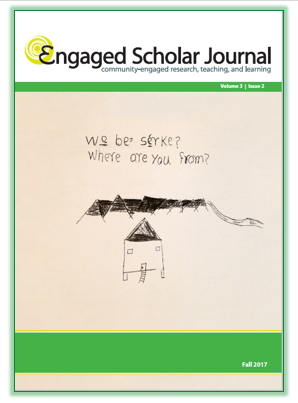Assessing the Outcomes of Community-University Engagement Networks in a Canadian Context
DOI:
https://doi.org/10.15402/esj.v3i2.328Keywords:
networks, community engagement, higher education, knowledge democracy, outcomesAbstract
Inter-organizational networks are proliferating as a tool for community-university engagement (CUE). Focusing on three Canadian inter-organizational networks that bring communities and universities together, Community Based Research Canada (CBRC), the Pacific Housing Research Network (PHRN) and the Indigenous Child Well-being Research Network, this paper identifies key criteria for assessing these networks’ outcomes and highlights factors that contribute to these networks’ challenges and successes. This work is part of a growing body of scholarship seeking to better understand the role and contribution of networks in society and more specifically how the outcomes of these engagements might benefit and enhance collaborative research partnerships between civil society and higher education institutions. The results illuminate lessons learned from each of these three networks and their members. These findings inform broader research into community-university engagement networks and illustrate how these types of engagements can help build a stronger knowledge democracy in Canada and elsewhere.
Downloads
Published
How to Cite
Issue
Section
License
Authors who publish with this journal agree to the following terms:
- Authors retain copyright and grant the journal right of first publication with the work simultaneously licensed under a Creative Commons Attribution License CC BY 4.0 that allows others to share the work with an acknowledgement of the work's authorship and initial publication in this journal.
- Authors are able to enter separate, additional contractual agreements for the non-exclusive distribution of the journal's published version of the work (e.g., post it to an institutional repository or publish it in a book), with an acknowledgement of its initial publication in this journal.
- Authors are permitted to post their work online (e.g., in an institutional repository or on their website) after the publication of their work in the Engaged Scholar Journal.
- Please note that while every opportunity will be taken to ensure author participation in the editing process, due to time constraints final copyediting changes may be made before publication to ensure APA adherence throughout all submissions.




